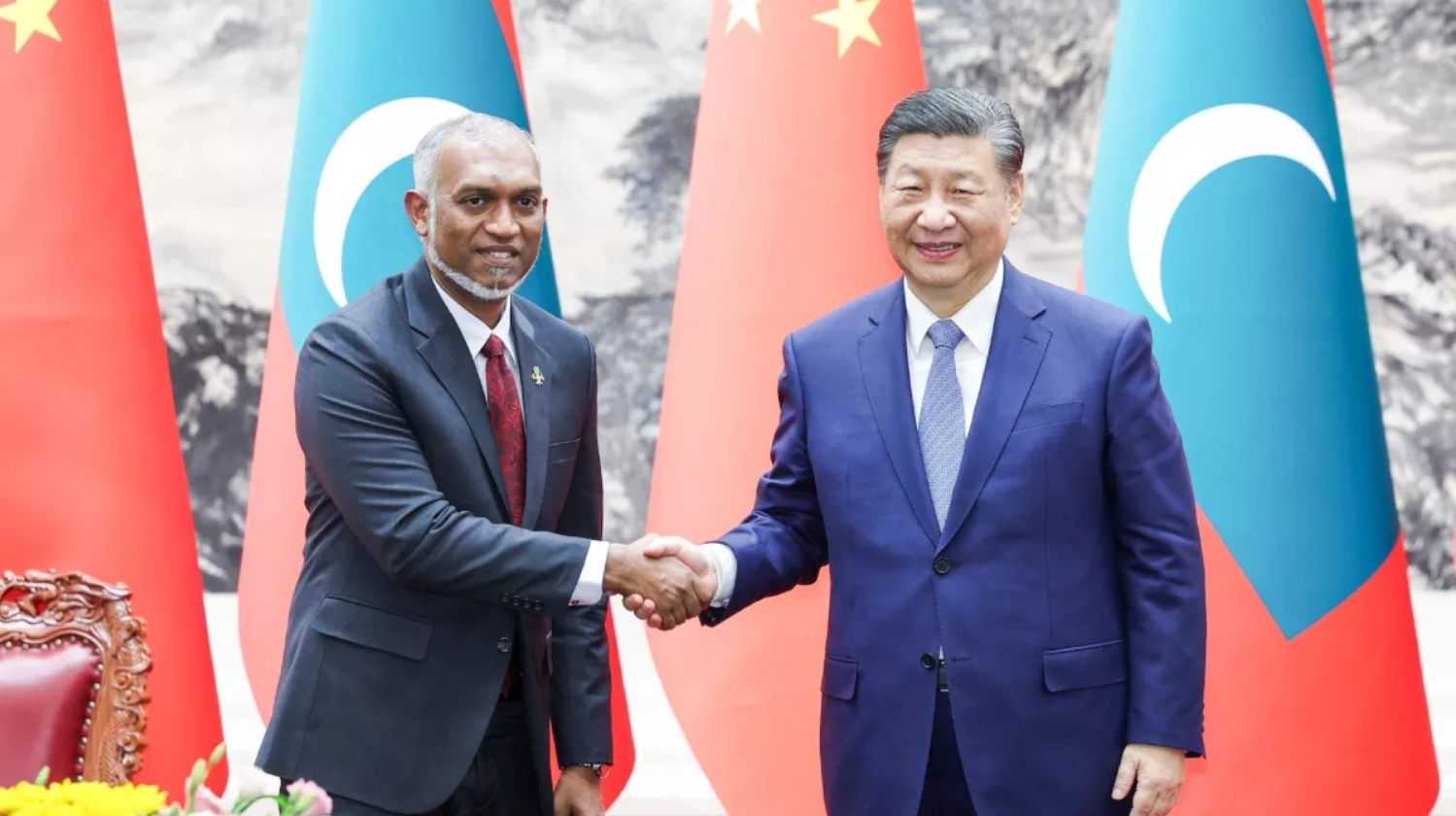International
Muizzu asks India to withdraw troops by March 15: Why are Indian soldiers in Maldives?
Date • 2024-01-13 304
Maldivian President Mohamed Muizzu has asked India to withdraw its military personnel from his country by March 15, a senior official said in Male on Sunday, nearly two months after Maldives sought their removal.
“Indian military personnel cannot stay in the Maldives. This is the policy of President Dr Mohamed Muizzu and that of this administration,” Abdulla Nazim Ibrahim, the public policy secretary at the President’s Office, said.
Maldives and India have set up a high-level core group to negotiate the withdrawal of troops. The group held its first meeting at the Foreign Ministry Headquarters in Male on Sunday morning. The meeting was also attended by Indian High Commissioner Munu Mahawar, Maldivian media reports said.
The Indian government did not immediately confirm the media report or comment on it.
Why is Muizzu insisting on Indian troops leaving Maldives? And why are Indian troops stationed in the islands at all? What is their strength? We explain.
How many Indian troops are in the Maldives?
Contrary to what the ‘India Out’ rhetoric in Maldives may suggest, no large contingent of Indian soldiers is present on the archipelago. According to the latest government figures, there are 88 Indian military personnel in the Maldives.
Indian soldiers have been sent to the Maldives at various points for training Maldivian troops, in both combat and reconnaissance and rescue-aid operations. Yet, there have been some Maldivian nationals, including politicians who have protested their presence in any capacity in the country. Analysts in the Maldives and India say that the ‘India Out’ campaign has exaggerated the role that these soldiers play in the Maldives and have portrayed their presence as a threat to the country’s national security.
There have been multiple factors at play and these anti-India sentiments were further inflamed during the recent presidential elections in the Maldives, where disinformation and misinformation, particularly against India, was rampant. This is due to multiple reasons, including the pushing of a narrative that the Ibrahim Mohamed Solih-led Maldivian Democratic Party was a political party influenced by India. The coalition of the People’s National Congress & the Progressive Party of Maldives party, whose representative President Muizzu won the 2023 presidential election, is considered to be pro-China.
Why are India’s troops in Maldives?
India and the Maldives have a long history of cooperation in a variety of areas, including defence. The one time India’s soldiers entered the island for an actual military operation was in November 1988 — to thwart an attempted coup, at the request of the government of then President Maumoon Abdul Gayoom. In a quick operation, Indian troops managed to secure the President and capture the rebels. In the three decades since, Maldives has generally appreciated India’s role in this episode.
What are the five major factors behind the fear and suspicion?
One of the major triggers for this was the long-standing controversy over two Dhruv Advanced Light Helicopters (ALF) given by India to the Maldives in 2010 and in 2015, both of which were used for ocean search-and-rescue operations, maritime weather surveillance and for airlifting patients between islands, and were based in Addu Atoll and at Hanimaadhoo.
According to the terms of bilateral agreements between the two countries, Indian officers had been sent to the Maldives to train the Maldives National Defence Force, under whose command these helicopters operate.
“These helicopters were for humanitarian purposes only, but some in the anti-India constituency, particularly Yameen’s party PPM, were trying to portray that by gifting these helicopters, India was creating military presence in the country because they were military choppers,” Dr. Gulbin Sultana, a research analyst at the Manohar Parrikar Institute for Defence Studies and Analyses, whose area of research includes the Maldives, had told indianexpress.com in 2021.
Another major cause of grievances within Maldives was the Solih government’s perceived lack of transparency about its dealings with India.
Then there is the fact that Maldives does rely heavily on India for maritime security. As Maldivian history expert Rasheeda M Didi wrote for the Carnegie Endowment for International Peace in 2022, India, Maldives and Sri Lanka collaborate to counter common maritime security threats and challenges such as illicit trafficking; piracy; and illegal, unregulated (or unreported) fishing, a major concern for the archipelago.
Didi wrote that another flashpoint was Maldives’ new police academy, built with India’s help and housing the National College of Policing and Law Enforcement. “The opposition’s [now in power] mistrust stems from the sheer size of the building and surrounding complex. One rumor making the rounds implies that the only reason the academy is so large is to house Indians associated with the academy and their families, supposedly rendering it an opportune place to bring more Indians into the country. This conjecture, however, is unfounded,” she wrote.
A fifth factor is the UTF Harbour Project agreement signed between India and the Maldives in February 2021, under which India was to develop and maintain a coastguard harbour and dockyard at Uthuru Thilafalhu, a strategically located atoll near the capital Malé. Sections of Maldivian media had speculated that the UTF project would be turned into an Indian naval base. However, then Maldivian chief of defence forces, Major-General Abdulla Shamaal, had clarified even before the agreement was signed that while the Indian government had indicated it would provide grant assistance for the project, there were no plans of any Indian naval base in the country.